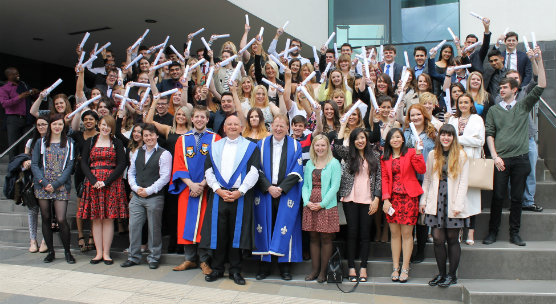Dundee continues to lead the way in widening access
Published On Thu 9 Jun 2016 by Grant Hill

The number of students from the most deprived areas of Scotland taking up places at the University of Dundee has more than doubled in recent years.
Figures from the university admissions body UCAS show that the number of students from the most-deprived 20 per cent (MD20) and 40 per cent (MD40) of areas matriculating at Dundee has risen sharply since 2010 and particularly since 2012.
Across Scotland, the 1,215 18-year-old MD20 applicants taking a place at a Scottish university in 2015 represented a fall on the 1,305 figure the previous year.
In contrast, Dundee’s MD20 matriculations rose 10 per cent last year for this age group. Across all age groups, MD20 and MD40 matriculations rose from 275 to 325 and from 360 to 415 respectively in that time. Since 2012, Dundee's figures have risen by 124 per cent (MD20) and 121 per cent (MD40).
Of the 2,065 students from Scotland who took a place at Dundee in 2015, 36 per cent were from MD40 backgrounds.
“We are delighted that Dundee has once again been shown to be leading the way in widening access to higher education in Scotland,” said Professor Karl Leydecker, Vice-Principal (Learning & Teaching) at the University.
“This rise is entirely expected, however, as we are sector leaders in widening access. Through contextualised admissions, intensive work with schools and many innovative schemes, we work hard to ensure that all highly able students, regardless of background, can access Scotland's University of the Year.
“We have invested heavily in our Access & Participation programme and staff have worked tirelessly to make the dream of a university education a reality for students from areas of deprivation. These statistics show that our approach is working exceptionally well but the real evidence comes when you speak to these students and graduates about how it has opened up exciting new opportunities that will transform their lives.”
In 2012, the Scottish Government introduced the Additional Places scheme in response to a fall in the number of students from the most deprived areas attending university across Scotland. In 2010, Dundee’s admissions stood at 205 (MD20) and 480 (MD40).
The University interacts with prospective students from areas of multiple deprivation in order to help them overcome obstacles right the way through from initial participation to them completing their course.
Its widening access work has seen the University heralded by politicians and organisations championing social mobility. Dundee’s innovative and pioneering approach to widening access promotes the value of holistic, contextual selection and supports in-house preparation for study opportunities. Staff are continuing to develop work in a number of areas, including fair admissions and gender equality.
One of the University’s most successful initiatives is the DUAL Summer School. Since 1993, 2,000 students have benefited from this pathway, which allows potential undergraduates of all ages to qualify, prepare and progress to a degree.
The course has a 95 per cent completion rate and those who have progressed to University go on to graduate with degree classifications above the Scottish average. This year’s cohort of new students started Summer School this week.
For media enquiries contact:
Grant Hill
Press Officer
University of Dundee
Nethergate, Dundee, DD1 4HN
Tel: +44 (0)1382 384768
Mobile: 07854 953277
Email: g.hill@dundee.ac.uk